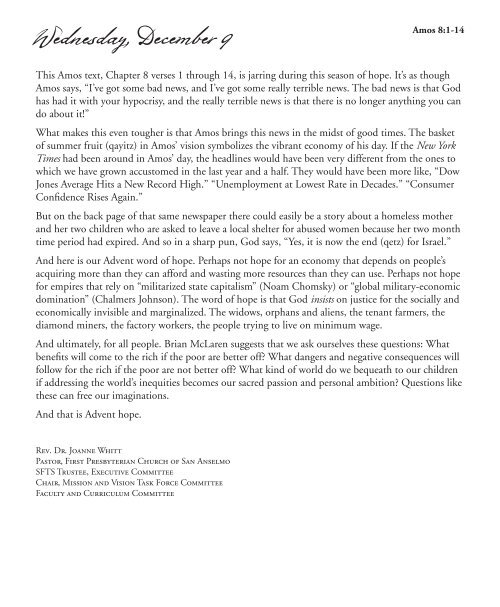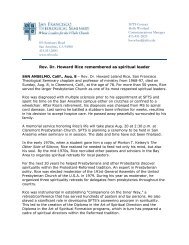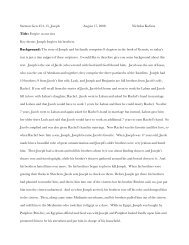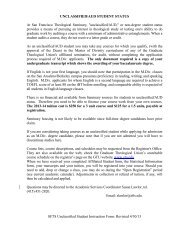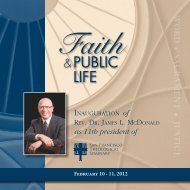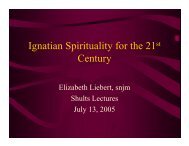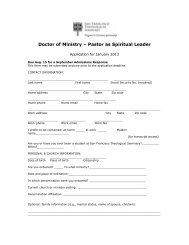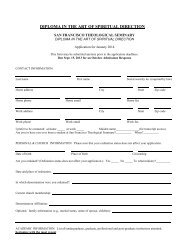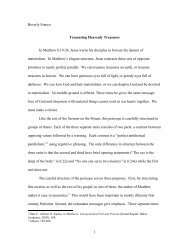Wednesday, December 9Amos 8:1-14This Amos text, Chapter 8 verses 1 through 14, is jarring during this season of hope. It’s as thoughAmos says, “I’ve got some bad news, and I’ve got some really terrible news. The bad news is that Godhas had it with your hypocrisy, and the really terrible news is that there is no longer anything you cando about it!”What makes this even tougher is that Amos brings this news in the midst of good times. The basketof summer fruit (qayitz) in Amos’ vision symbolizes the vibrant economy of his day. If the New YorkTimes had been around in Amos’ day, the headlines would have been very different from the ones towhich we have grown accustomed in the last year and a half. They would have been more like, “DowJones Average Hits a New Record High.” “Unemployment at Lowest Rate in Decades.” “ConsumerConfidence Rises Again.”But on the back page of that same newspaper there could easily be a story about a homeless motherand her two children who are asked to leave a local shelter for abused women because her two monthtime period had expired. And so in a sharp pun, God says, “Yes, it is now the end (qetz) for Israel.”And here is our <strong>Advent</strong> word of hope. Perhaps not hope for an economy that depends on people’sacquiring more than they can afford and wasting more resources than they can use. Perhaps not hopefor empires that rely on “militarized state capitalism” (Noam Chomsky) or “global military-economicdomination” (Chalmers Johnson). The word of hope is that God insists on justice for the socially andeconomically invisible and marginalized. The widows, orphans and aliens, the tenant farmers, thediamond miners, the factory workers, the people trying to live on minimum wage.And ultimately, for all people. Brian McLaren suggests that we ask ourselves these questions: Whatbenefits will come to the rich if the poor are better off? What dangers and negative consequences willfollow for the rich if the poor are not better off? What kind of world do we bequeath to our childrenif addressing the world’s inequities becomes our sacred passion and personal ambition? Questions likethese can free our imaginations.And that is <strong>Advent</strong> hope.Rev. Dr. Joanne WhittPastor, First Presbyterian Church of <strong>San</strong> AnselmoSFTS Trustee, Executive CommitteeChair, Mission and Vision Task Force CommitteeFaculty and Curriculum Committee
Psalm 37:1-18Thursday, December 10The One Who Laughs Last, Laughs BestThis Psalm says the wicked thrive, and by wicked you may understand your special, most-hated person. The methods of the wicked arefrankly successful. For every Barnard Madoff brought to trial, there are probably hundreds or thousands who get away. The same goesfor liars, cheats, thieves, character assassins, child abusers, pushers, pimps, and murderers, not to mention certain run-of-the mill investors,capitalists, socialists, lawyers, politicians, contractors, relatives, and even a few clergy. It is the privilege of a minister to counsel at least oneof each in the course of one’s working life. The Psalm also says you should not worry, by reason of your faith in the plans of a just God.I make no secret of the fact that I frankly adore verses of vengeance in the Psalter, and I take tremendous pleasure chanting them in Latin.I close my eyes and visualize my enemies. I relish the syllables, raise my voice, and see bodies falling to the ground. There are swords andarms horribly broken. Gladius eorum intret in corda ipsorum! (verse 15). Quoniam brachia peccatorum conterentur! (verse 17). But alas,this Psalm, like many Psalms, presents what medieval theologians called an argumentum cornutum, a horned argument. Whichever pointof the Psalm you concede, a Christian should feel oneself caught on the horns of a moral dilemma.For, “you” are presumed to be a very particular kind of person who follows an absurdly selfless path, and you must follow this path almostblindly. Because, as the Psalm says, the wicked really do thrive, yet you should relax and count on their demise. All this believing, “Trustin the Lord . . . Take delight in the Lord,” which a Christian may associate with the kingdom of God as Jesus taught it, has a delightfullyReformation-Evangelical ring to it. But the Psalm requires much more of me than faith. The meek shall replace the wicked. It tells me tobe one of them, weak in fact, while possessing the confidence of a man or a woman who has actually inherited the earth. In this strangeway, the pleasure of vengeance should belong to those who don’t really feel it, and this leaves us caught on the horns of a dilemma. ThePsalmist has feelings. He wants to see blood, as it were. Is there not a little anger in singing the defeat of enemies or a little greed along theedges of the promise of an equal prosperity? How do I take comfort in such promises if I don’t actually want what the wicked have? I don’ttake this Psalm, or any Psalm of vengeance, as a mere statement of future victory. I think it encourages, confronts, and unsettles a certainmoral-emotional complex.It’s interesting to me that early Protestants took this Psalm not in the individualist-fideist manner I just suggested (those with faith shallbe violently vindicated by God – hurray), but as a description of the quality of life in the church. It’s frankly a hard life, since the churchis constantly persecuted and abused. The Psalm therefore offers a tremendous consolation to the faithful, said John Calvin. The Psalmis about the scandal of the cross to human reason, said Philip Melanchthon. It’s not that the mind objects to the success of the wicked.Melanchthon assumed that misery was normative in this life for everyone, and the righteous share this misery with the wicked. The humanmind, he said, cannot understand how good and evil people, the just and the unjust, should share the same miseries. The church should berewarded, while the evil deserve to suffer, yet both suffer together. And this is a cognitive problem. The wicked are bad at “figuring thingsout” (ratiocinare). They fail to grasp the “distant providence” of God. Yet confidence in this distant providence, the church’s relaxed faithin future justice, is not what Melanchthon saw emphasized here. The Psalm demands, he noted, that “we obey God, lest offended at thesight that sorrows are common (to the just and unjust), we fail.”The Sternhold and Hopkins Psalter, a Psalter often published with the King James Bible in the seventeenth century, began the Psalm likethis:Grudge not to see the wicked menin wealth to flourish stillNor yet envie such as to illhave bent and set their will.For as greene grasse and flourishing heathsare cut and wither away:So shall their great prosperitysoon passe, fade, and decay. . .And it continued later,Shake off despight, crime, and hate.Dr. Chris OckerSFTS Professor of Church History
- Page 4 and 5: Sunday, November 29Amos 1:1-5; 1:13
- Page 6 and 7: Tuesday, December 1Matthew 1: 22-23
- Page 8: Thursday, December 3“Joy to the W
- Page 11 and 12: Luke 1:57-68Sunday, December 6This
- Page 13: Matthew 22:34-46Tuesday, December 8
- Page 18 and 19: Sunday, December 132 Thessalonians
- Page 20 and 21: Tuesday, December 15“O Come, O Co
- Page 22 and 23: Thursday, December 17Matthew 24:1-1
- Page 24 and 25: Saturday, December 19Matthew 25:31-
- Page 26 and 27: Monday, December 21Luke 1: 1-25A so
- Page 28 and 29: Wednesday, December 23Luke 1:39-56
- Page 32: Northern California Campus105 Semin


